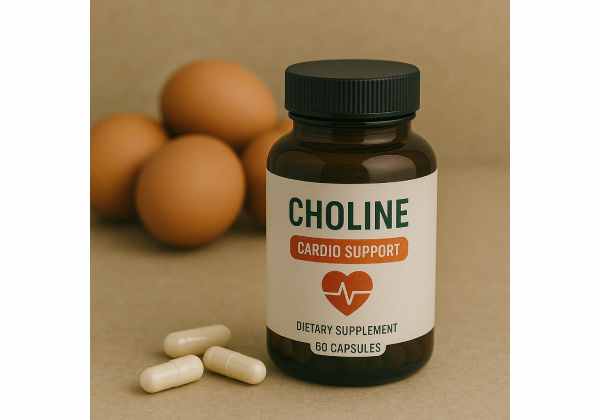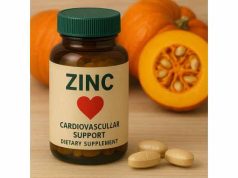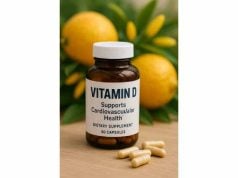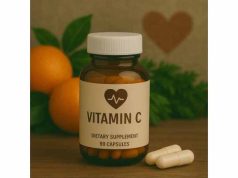
Choline has garnered significant attention for its potential in supporting overall heart health and preventing numerous cardiovascular issues. This essential nutrient plays a vital role in cellular function, contributing to healthy cholesterol metabolism and vascular integrity. By helping optimize neurotransmission, liver function, and lipid transport, choline may offer comprehensive support for heart health and mitigate a range of cardiovascular challenges. Whether you’re curious about natural sources, interested in taking choline supplements for cardiovascular benefits, or simply aiming to fortify your daily nutrition, exploring its properties can provide powerful insights into how choline for heart health can become part of a well-rounded, preventive regimen.
Table of Contents
- Key Characteristics and Foundational Overview
- The Mechanisms Behind Choline’s Effects
- Documented Cardiovascular Advantages and Supporting Research
- How to Use, Recommended Amounts, and Potential Risks
- Frequently Asked Questions
- References and Sources
Key Characteristics and Foundational Overview
Choline is an essential, water-soluble nutrient that often gets grouped with the B-complex vitamins due to its similarities in function and importance. First recognized as a critical dietary component by the Institute of Medicine in 1998, choline plays a substantial role in various bodily processes, including structural support of cell membranes, neurotransmission, and lipid metabolism. From a cardiovascular perspective, choline for cardiovascular health is especially notable because it influences the way the body manages lipids, thus potentially impacting cholesterol levels and maintaining blood vessel integrity.
Natural Occurrence and Dietary Sources
You can obtain choline through various food sources, with the richest supply typically found in:
- Organ meats (e.g., liver)
- Egg yolks
- Salmon, cod, and other fish
- Legumes like soybeans
- Cruciferous vegetables, including broccoli and Brussels sprouts
- Whole grains, such as wheat germ
Because many people don’t consume enough of these foods in their daily meals, some individuals might experience deficiencies in choline intake. These deficiencies can lead to a range of symptoms, from general fatigue and muscle aches to negative impacts on cognitive function and liver health.
Why Choline Matters for Vascular Support
From a vascular standpoint, choline contributes to the structural integrity of cells by helping synthesize phosphatidylcholine, a major phospholipid found in cell membranes. Healthy membranes are more resilient and efficient at nutrient exchange. Over time, deficits in choline might disrupt membrane stability, potentially hindering vascular performance and weakening the body’s defenses against certain heart conditions.
Historical Context and Scientific Recognition
Choline’s significance is not a new discovery; scientists have studied its role for decades. Early experiments linked choline deficiency to detrimental changes in liver function, muscle coordination, and nerve signaling. Eventually, researchers acknowledged that choline also exercises significant influence on cardiovascular well-being by assisting in the regulation of homocysteine levels. Elevated homocysteine is considered a risk factor for various cardiovascular issues, making choline’s involvement in metabolizing homocysteine particularly pertinent for heart disease prevention.
Choline and Metabolism
Central to understanding the role of choline in heart health is grasping how it works in synergy with other nutrients. For instance, choline teams up with folate (vitamin B9) and vitamin B12 to support metabolic processes, including homocysteine breakdown. This collaboration underlines why balanced nutrition is crucial; deficiencies in any of these compounds can disrupt the delicate processes that keep cardiac function in optimal shape.
Common Forms of Supplementation
When looking to boost choline intake through supplements, you may encounter various forms:
- Choline Bitartrate: Common and cost-effective, though it may require larger doses to deliver sufficient choline.
- Phosphatidylcholine (PC): Often derived from soy lecithin, phosphatidylcholine is known for its substantial choline content and benefits for liver health.
- Alpha-GPC (L-Alpha Glycerylphosphorylcholine): Highly bioavailable, often linked with cognitive and neurological advantages in addition to cardiovascular support.
- Citicoline (CDP-Choline): Noted for crossing the blood-brain barrier efficiently, providing benefits for mental clarity and possibly heart health as well.
Choosing the right supplement might depend on your individual health goals, accessibility, and budget. However, for those focusing on choline for vascular support or overall heart wellness, the type of choline source might not be as critical as ensuring consistent, adequate intake over time.
Intersection of Liver and Heart Health
Because the liver is central to lipid metabolism, it is intimately connected to heart health. When the liver functions properly, it effectively regulates triglycerides and other lipids, preventing the buildup of excess cholesterol that could contribute to atherosclerotic plaque formation. Choline helps keep the liver healthy by assisting in the export of fat from the liver into the bloodstream in a controlled manner. Inadequate choline leads to fatty liver accumulation, which can ultimately impact the cardiovascular system by way of elevated triglyceride levels. This synergy between liver function and heart health highlights why choline is recognized as a cornerstone nutrient in preventative cardiovascular care.
Choline’s Growing Popularity
While once overlooked, choline has become a popular topic in nutritional science as more studies reveal its wide-ranging benefits. Interest in choline for heart health has particularly increased, prompting both clinicians and laypeople to consider whether their diets provide enough of this critical nutrient. Coupled with emerging trends toward plant-based diets—which can inadvertently reduce choline intake—awareness about choline’s role in mitigating cardiovascular conditions is surging.
The Mechanisms Behind Choline’s Effects
Understanding how choline achieves its myriad benefits requires exploring several biological processes in detail. This nutrient’s biochemical actions extend beyond the obvious function of cell membrane support to include neurotransmission, lipid metabolism, and gene expression regulation. Such complexity explains why choline helps cardiovascular function and why it is often described as indispensable within the human diet.
Support for Neurotransmission
One of the most widely recognized roles of choline is its participation in the creation of acetylcholine, a neurotransmitter critical to both voluntary and involuntary bodily functions. Acetylcholine influences muscle contraction, heart rate, and nerve communication. When choline intake is inadequate, acetylcholine production may decline, potentially affecting heart rhythm regulation. This link positions choline as a crucial player in maintaining normal cardiovascular function through nerve and muscle coordination.
Methyl Donor for Metabolic Pathways
Choline acts as a methyl donor in various biochemical reactions. Methyl groups are essential to turning specific genes on or off, impacting everything from cell repair to metabolic processing. In the realm of heart health, choline’s capacity as a methyl donor is vital because it helps manage homocysteine levels—a known risk factor for heart disease. By aiding in the methylation and subsequent removal of homocysteine, choline ensures that arteries stay more resilient against plaque formation and oxidative stress.
Lipid Transport and Metabolism
Another pivotal mechanism of choline concerns its role in transporting lipids. Specifically, choline is required to synthesize very-low-density lipoproteins (VLDL), which are responsible for ferrying triglycerides out of the liver and into systemic circulation. When choline is insufficient, the liver cannot produce VLDL effectively, resulting in fat buildup and compromised lipid distribution. Elevated triglycerides in the bloodstream can, in turn, lead to arterial stiffness and an increased propensity for clot formation if combined with other metabolic imbalances.
Phospholipid Synthesis and Membrane Integrity
Choline is a precursor to phosphatidylcholine—a principal phospholipid in human cell membranes. Solid, well-structured cell membranes are integral to the smooth functioning of vascular cells. By contributing to membrane fluidity, choline aids the proper exchange of nutrients and waste products at the cellular level. Any reduction in membrane health can trigger inflammation or hamper the cells’ ability to combat oxidative damage, indirectly paving the way for cardiovascular vulnerabilities.
Anti-Inflammatory and Antioxidant Roles
While choline itself is not typically classified as an antioxidant, it may help lower pro-inflammatory markers and oxidative stress within the body. By fostering efficient lipid metabolism and cellular communication, choline indirectly reduces inflammatory responses that could damage vascular tissues. Chronic inflammation is widely recognized as a contributing factor to a host of heart diseases, including atherosclerosis and coronary artery disease.
Collaboration with Other Nutrients
Choline does not work in isolation. It teams up with a range of cofactors, including vitamins like folate and B12, to enable critical detoxification and metabolic processes. This synergy is vital because an insufficiency in any of these supporting nutrients can magnify the negative effects of inadequate choline. For instance, if folate or B12 is low, the capacity to recycle homocysteine into methionine diminishes, raising homocysteine levels and heightening cardiovascular risks.
Genetic Factors and Choline Requirements
Some individuals may have genetic variants that affect the enzymes needed for choline metabolism. These polymorphisms can increase a person’s choline requirement, making dietary intake or supplementation even more important. Those with certain genetic predispositions to higher cholesterol or homocysteine levels may find that choline supplementation delivers notable benefits, especially for those concerned with preventing heart-related conditions.
Hormonal Influences
Choline metabolism also varies by gender and life stage. Pre-menopausal women tend to have a slightly reduced dietary choline requirement due to estrogen’s supportive influence on choline production. However, during menopause, this advantage lessens, which might increase susceptibility to choline deficiency and associated cardiovascular risks. Being aware of one’s life stage can guide decisions about supplementation and overall dietary choices.
Holistic Impact
From a holistic perspective, choline’s extensive reach—from neurotransmission to lipid management—demonstrates why it holds so much promise for those looking to prevent or mitigate heart conditions. It acts both directly and indirectly, supporting structural, functional, and regulatory frameworks in the body. This broad activity underscores the notion that heart health is multifaceted, requiring a nutrient-dense diet, balanced lifestyle, and awareness of specific nutritional needs like choline for heart health.
Documented Cardiovascular Advantages and Supporting Research
The relationship between choline and cardiovascular health has been the focus of numerous studies, each bringing valuable insights into how this nutrient might support heart function and protect against disease. As scientists continue to investigate choline benefits for heart health, accumulating evidence underscores its role in preventing or managing issues such as high cholesterol, atherosclerosis, and hypertension.
Choline and Cholesterol Balance
Early research has shown that choline aids in moving lipids out of the liver and into the bloodstream, reducing the chances of excessive fat accumulation in hepatic tissues. Maintaining a well-functioning liver is integral to regulating overall cholesterol profiles. A properly balanced cholesterol profile—particularly lower LDL (low-density lipoprotein) and higher HDL (high-density lipoprotein)—is generally correlated with a lower risk of heart disease. Therefore, adequate choline intake could help individuals keep their cholesterol levels within a safer range.
Study Spotlight
- A 2010 study published in the American Journal of Clinical Nutrition found that participants with higher dietary choline intake had better cholesterol values, including reduced levels of LDL. While the study suggests correlation rather than causation, it highlights the nutrient’s potential in heart health management.
Homocysteine Metabolism
A key mechanism where choline helps cardiovascular function is in homocysteine regulation. Elevated homocysteine is recognized as an independent risk factor for cardiovascular diseases, including coronary artery disease and stroke. Choline supports the conversion of homocysteine back into methionine via methylation.
Study Spotlight
- In a landmark study featured in the Journal of Nutrition, individuals supplemented with choline showed decreased plasma homocysteine levels. This finding was particularly significant in people who were borderline deficient in B vitamins, implying that choline supplementation might be especially beneficial in those scenarios.
Vascular Integrity and Reduced Inflammation
Inflammation plays a critical role in the initiation and progression of atherosclerosis. Several observational studies have proposed that choline’s involvement in lipid metabolism can lessen pro-inflammatory triggers, mitigating plaque buildup in arterial walls.
Study Spotlight
- A clinical trial published in the Atherosclerosis journal indicated that individuals with ample choline intake showed lower markers of systemic inflammation like C-reactive protein (CRP). While CRP is a nonspecific marker, elevated levels have been associated with increased cardiovascular events, making these findings relevant for preventive strategies.
Blood Pressure Regulation
Although more research is needed, some preliminary data suggests that choline’s effect on lipid profiles and vascular health may indirectly impact blood pressure management. By keeping arteries more pliable and reducing buildup, choline could help in maintaining normal vascular pressure.
Study Spotlight
- A pilot study in the European Journal of Clinical Nutrition implied that an adequate intake of choline might help maintain healthy blood pressure, especially when combined with other lifestyle factors such as a balanced diet, regular exercise, and weight management.
Potential Role in Arrhythmias
Acetylcholine, which depends on choline for its formation, is deeply involved in heart rate regulation. Some experts hypothesize that choline could have a stabilizing influence on heart rhythms, particularly under stress or when the sympathetic nervous system is overactive.
Study Spotlight
- Research exploring the link between choline levels and cardiac arrhythmias is still nascent. Nevertheless, anecdotal clinical observations suggest patients with healthy choline levels may have improved heart rate control under scenarios involving acute stress.
Synergies with Omega-3 Fatty Acids
Choline is frequently paired with omega-3 fatty acids (like DHA and EPA) in advanced supplement formulations. The synergy can be compelling because while omega-3s help reduce inflammation and may also lower triglycerides, choline ensures optimal lipid export and methylation. This combined approach can offer multifaceted protection against cardiovascular disease progression.
Dietary Patterns and Epidemiological Insights
Epidemiological studies show that populations consuming more choline-rich foods also tend to follow diets that are generally considered heart-friendly, such as the Mediterranean diet. This pattern includes fish, legumes, and whole grains, all of which contain varying levels of choline. The correlation underlines the broader principle that a varied diet rich in whole, minimally processed foods often serves as the best approach to preventing cardiovascular conditions.
Ongoing Research
New studies are continually emerging, exploring everything from choline’s effect on arterial plaque progression to its interplay with other micronutrients in preventing congestive heart failure. Recent advances in nutritional genomics also hold promise for tailoring choline intake to individual genetic profiles, thereby opening new frontiers in personalized nutrition and specialized cardiac care.
By gathering evidence across these diverse research areas, it becomes evident that adequate choline intake supports key processes essential for a healthy heart. While no single nutrient can guarantee total protection against cardiovascular disease, choline stands out for its multi-pronged impact on lipid metabolism, inflammation, and homocysteine regulation.
How to Use, Recommended Amounts, and Potential Risks
If you’re aiming to leverage the full benefits of choline for cardiovascular health, understanding the recommended dosages, potential risks, and practical usage guidelines is paramount. Though choline is generally considered safe, different populations may have varying needs, and certain risk factors demand closer attention.
Determining the Right Dosage
Official choline intake recommendations vary by age, gender, and specific health circumstances. According to the Food and Nutrition Board of the Institute of Medicine, the Adequate Intake (AI) levels for adults are:
- Men (19 years and older): Approximately 550 mg/day
- Women (19 years and older): Approximately 425 mg/day
- Pregnant women: Around 450 mg/day
- Breastfeeding women: Around 550 mg/day
These guidelines serve as general benchmarks. Some clinicians suggest that individuals seeking choline benefits for heart health could benefit from intakes slightly above the AI, especially if they have genetic predispositions or are experiencing higher stress levels.
Supplement Forms and Bioavailability
Choosing the right form of choline can affect how quickly and effectively your body uses it:
- Choline Bitartrate: Budget-friendly but often less potent.
- Phosphatidylcholine (PC): Good balance between cost and benefit.
- Alpha-GPC: Known for strong absorption and neurological benefits.
- Citicoline (CDP-Choline): Offers robust cognitive support with potential cardiovascular perks.
Each form has distinct bioavailability and dosage recommendations. For instance, alpha-GPC typically requires lower overall doses to achieve optimal plasma choline levels compared to choline bitartrate.
Timing and Absorption
Choline supplements can be taken at any time of day, but some anecdotal reports suggest taking them earlier in the day can help with mental clarity, as acetylcholine production may support cognitive tasks. When combined with meals, choline absorption might improve. However, high-fiber or high-fat meals could slightly impact nutrient uptake, so consistency in timing and meal composition can be helpful.
Interactions with Other Nutrients
Because choline works synergistically with folate, vitamin B6, and vitamin B12, ensuring you receive adequate amounts of these nutrients can amplify choline’s heart health benefits. If you’re taking a B-complex supplement or a multivitamin, check the label to ensure it includes these micronutrients. People already supplementing with vitamins B6, B9, and B12 may consider adding choline as part of a comprehensive strategy to support cardiovascular function.
Potential Side Effects and Toxicity
Choline is largely safe for most adults, even at moderately elevated intakes. However, extremely high doses can lead to:
- Fishy body odor: Caused by the breakdown of choline into trimethylamine (TMA).
- Gastrointestinal discomfort: Nausea, stomach cramping, or diarrhea in some individuals.
- Hypotension: Very high doses could lower blood pressure, though evidence is limited.
The Tolerable Upper Intake Level (UL) for adults is set at 3,500 mg of choline per day, but most people don’t approach that level through regular diet and modest supplementation. It’s always wise to discuss any high-dose supplementation regimen with a healthcare provider, especially if you have preexisting conditions or take other medications.
Population-Specific Considerations
- Pregnant and Breastfeeding Women: Choline is crucial for fetal and newborn development, so these groups often require more choline. The recommended daily intake increases accordingly.
- Older Adults: As we age, choline absorption can decline, and certain metabolic pathways may become less efficient. Supplementing choline might help address age-related cardiovascular risks.
- Individuals with Certain Genetic Polymorphisms: Genetic variations can heighten the body’s choline demands. Personalized testing may be beneficial for those with a strong family history of heart disease or high cholesterol levels.
- Plant-Based Dieters: Vegans and vegetarians may consume lower choline levels naturally. However, several plant sources (soybeans, chickpeas, quinoa, cruciferous vegetables) offer moderate amounts. Supplementation can be useful if dietary intake is insufficient.
Practical Tips for Integrating Choline
- Focus on Food First: Before turning to supplements, review your diet. Adding eggs, fish, and legumes can supply meaningful amounts of choline for heart health.
- Check for Deficiencies: Some symptoms, like muscle aches or memory lapses, might suggest low choline. Consult a healthcare professional to identify deficiencies through blood tests.
- Combine with Other Heart-Healthy Habits: Remember that choline is just one component of a multi-layered approach to cardiovascular well-being. Incorporate regular physical activity, maintain a balanced weight, and manage stress levels.
- Stay Consistent: Many people see improved benefits by taking choline consistently rather than sporadically. Keep track of how you feel over weeks or months to gauge whether adjustments in dosage are needed.
By following these guidelines, individuals looking to fortify their cardiovascular systems can do so safely and effectively. As with any supplement, choline should be part of a comprehensive strategy that includes a healthy diet, regular exercise, and routine medical check-ups to monitor vital markers like cholesterol levels and blood pressure.
Frequently Asked Questions
How does choline help cardiovascular function?
Choline supports cardiovascular function by transporting lipids, regulating homocysteine, and contributing to cell membrane integrity. These actions can influence cholesterol balance, manage inflammation, and potentially stabilize arterial health for better overall heart performance.
Is choline necessary if I already take a multivitamin?
Many multivitamins contain little or no choline. If your primary goal is better heart health or you consume limited choline-rich foods, an additional choline supplement may be beneficial. Check the label or consult a healthcare provider to confirm your actual intake.
Can choline lower my cholesterol?
Adequate choline intake may assist in balancing cholesterol by promoting efficient lipid export from the liver. While not a direct cholesterol-lowering agent, choline’s role in healthier lipid metabolism can indirectly support improved cholesterol values over time.
Are there natural alternatives to choline supplements?
Eating choline-rich whole foods—like eggs, liver, and legumes—remains the most natural alternative. Incorporating these foods regularly in your diet can help maintain adequate choline levels without the need for a standalone supplement.
What are the risks of too much choline?
Although rare, very high choline intake can result in a fishy body odor, digestive discomfort, or lowered blood pressure. Staying within the recommended range and consulting a healthcare provider can help you avoid adverse effects.
Is choline suitable for pregnant women?
Yes, choline is particularly important during pregnancy for fetal brain development. Most health authorities recommend higher choline intake during pregnancy and breastfeeding. However, always consult your OB-GYN before adjusting any supplement regimen.
How soon can I expect to see results from supplementing choline?
Results can vary depending on your starting choline levels and other factors like diet and exercise. Some people notice improvements in energy or focus within weeks, while cardiovascular benefits may take longer to manifest through lab results.
Does cooking food reduce its choline content?
Certain cooking methods may mildly reduce choline content. However, the overall loss is not typically significant. Steaming or boiling vegetables briefly can help retain more of their nutrient density compared to prolonged cooking or frying.
Can choline assist with blood pressure management?
Although research is still developing, choline’s role in supporting arterial flexibility and normal lipid levels may indirectly help maintain healthy blood pressure. Pairing choline intake with a balanced diet and exercise can further support positive outcomes.
Is choline beneficial for people following a plant-based diet?
Choline is vital for everyone, including vegans and vegetarians. While plant-based foods provide choline, certain diets may risk shortfalls. Supplementing can help ensure adequate intake to support heart health, particularly if one relies on heavily processed food items.
References and Sources
- Institute of Medicine. Dietary Reference Intakes for Thiamin, Riboflavin, Niacin, Vitamin B6, Folate, Vitamin B12, Pantothenic Acid, Biotin, and Choline. Washington, DC: The National Academies Press, 1998.
- da Costa, K.-A., et al. “Elevated Serum Creatine Phosphokinase in Choline-Deficient Humans.” American Journal of Clinical Nutrition, vol. 88, 2008, pp. 940–945.
- Zeisel, S.H., and Da Costa, K.-A. “Choline: an Essential Nutrient for Public Health.” Nutrition Reviews, vol. 67, no. 11, 2009, pp. 615–623.
- Dalmeijer, G.W., et al. “Plasma Choline Concentrations Are Associated with Blood Pressure in the General Population.” European Journal of Nutrition, vol. 52, no. 3, 2013, pp. 1129–1136.
- Detopoulou, P., et al. “Dietary Choline and Betaine Intake in Association with Concentrations of Inflammatory Markers in Healthy Adults: The ATTICA Study.” American Journal of Clinical Nutrition, vol. 87, no. 2, 2008, pp. 424–430.
- Wang, Z., et al. “Gut Flora Metabolism of Phosphatidylcholine Promotes Cardiovascular Disease.” Nature, vol. 472, 2011, pp. 57–63.
- Ueland, P.M. “Choline and Betaine in Health and Disease.” Journal of Inherited Metabolic Disease, vol. 34, 2011, pp. 3–15.
Disclaimer:
This article is for educational purposes only and does not replace professional medical guidance. Consult a qualified healthcare provider before making any significant dietary or supplemental changes, particularly if you have underlying health conditions or are on medication.
We encourage you to share this article on Facebook, X (formerly Twitter), or your favorite platforms, and follow us on social media for more insights on choline and other heart-supportive nutrients!






